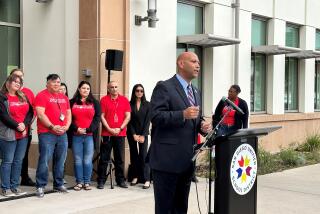Police Want Agent in Penn Case to Retire
The San Diego Police Department is seeking an early retirement for Donovan Jacobs, and the controversial police agent who was wounded in a highly publicized shooting has filed a grievance with the city manager’s office to keep his job.
Jacobs, wounded during the 1985 shooting incident involving Sagon Penn, is fighting to retain his desk assignment as the administrative officer in the Police Department’s Narcotics Street Team.
In his grievance form, Jacobs contends that his “involuntary resignation/retirement” violates established city civil service policies and department procedures.
He cited a 1978 memorandum from the city manager and personnel director that encourages the retention of disabled employees rather than their retirement. The memo states that “every effort” should be made to place a disabled employee in a job compatible with his injuries.
Jacobs was shot when he and Police Agent Thomas Riggs stopped Penn in March, 1985. During a struggle, Penn seized Jacobs’ revolver and killed Riggs, shot Jacobs in the neck and wounded a civilian ride-along.
Nerve Damaged
During trials in which Penn was twice acquitted, Jacobs testified that the bullet wound cut off nerve impulses to his left shoulder muscle, that his arm is “pretty much paralyzed” and that he suffers numbness in his right hand and both feet.
Attempts to contact Jacobs, a nine-year police veteran, were unsuccessful.
His grievance file contends that city policies permit his continued employment, rather than dismissal.
The 1978 memo states that new assignments should be found for employees no longer deemed physically able to perform their current duties.
“A review of all department job assignments shall be completed and every effort shall be made to place the employee in a position compatible with both his/her physical limitations and experience and educational backgrounds,” the memo states.
It also says the city’s Rehabilitation Unit and the Personnel Department should meet with the employee to find acceptable work and, only if that is unsuccessful, should the worker resign or be retired or terminated.
Jacobs’ attorney, Patrick Thistle, said Thursday that though the department has given no written decision in the case, it has been “painfully obvious” that the department wants his client out.
“He was called in and told he had to retire,” Thistle said. “He felt that wasn’t appropriate, so we filed a grievance.”
The attorney said Jacobs’ problem is similar to others faced by police employees who have been injured over the years and who the department would like to retire to make room for new beat officers.
“The gist of it is that the department has been looking closely at permanently disabled people and is moving toward the position that if people can’t return to the field, they won’t keep working at the Police Department,” he said.
Police Chief Bill Kolender acknowledged Thursday that “what is happening to Donovan Jacobs is strictly routine.”
“It’s the City of San Diego’s decision,” Kolender said. “If you can’t be a police officer, you must retire. And they are retired as soon as they have injuries.”
He said Jacobs is at the 74% disability level.
“My personnel people talked to him about rehabilitation and the money available to him,” Kolender said. “He has appealed their decision. I don’t understand it. This is what happens to everyone. The man can’t be a police officer. I’m sorry to say that.”
Asked whether Jacobs was being forced out because of negative publicity brought on the department in the Sagon Penn case, Kolender said: “That is absolutely ridiculous. He gets full benefits. He is taken care of.”
More to Read
Sign up for Essential California
The most important California stories and recommendations in your inbox every morning.
You may occasionally receive promotional content from the Los Angeles Times.











